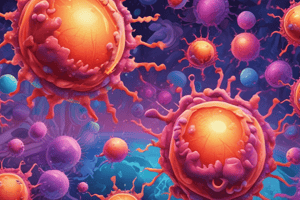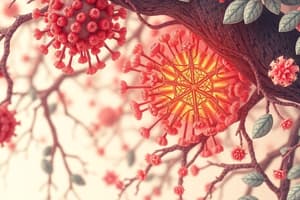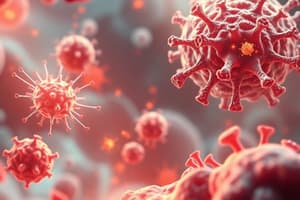Podcast
Questions and Answers
What are tumor-associated antigens (TAAs)?
What are tumor-associated antigens (TAAs)?
- Antigens that are unique to a specific cancer type
- Proteins that are only found in benign tumors
- Normal proteins expressed inappropriately by tumor cells (correct)
- Proteins that are exclusively produced by cancer cells
Which of the following is an example of a tumor-associated antigen that is normally expressed in the testes?
Which of the following is an example of a tumor-associated antigen that is normally expressed in the testes?
- Trastuzumab
- Her2/neu receptor
- MAGEA3 (correct)
- EGF receptor
How does the Her2/neu receptor contribute to cancer progression?
How does the Her2/neu receptor contribute to cancer progression?
- By reducing protein synthesis in the cell
- By inhibiting cell division
- By causing the cell to undergo apoptosis
- By promoting increased growth factor signaling (correct)
What therapeutic strategy is used to target the Her2/neu receptor in cancer treatments?
What therapeutic strategy is used to target the Her2/neu receptor in cancer treatments?
What is the primary role of the immune surveillance system?
What is the primary role of the immune surveillance system?
What mechanism leads to de-repressed expression in tumor-associated antigens?
What mechanism leads to de-repressed expression in tumor-associated antigens?
Which process results in the overexpression of normal proteins in some cancers?
Which process results in the overexpression of normal proteins in some cancers?
Which target is specifically addressed by Imatinib in the context of targeted cancer therapy?
Which target is specifically addressed by Imatinib in the context of targeted cancer therapy?
What is one therapeutic approach that aims to stimulate the body’s immune response specifically against tumor cells?
What is one therapeutic approach that aims to stimulate the body’s immune response specifically against tumor cells?
Which of the following is a method of delivering a therapeutic cancer vaccine?
Which of the following is a method of delivering a therapeutic cancer vaccine?
How do oncolytic viruses contribute to tumor-specific immune responses?
How do oncolytic viruses contribute to tumor-specific immune responses?
What characteristic of Class I MHC molecules aids in T cell recognition of tumor antigens?
What characteristic of Class I MHC molecules aids in T cell recognition of tumor antigens?
Which cancer immunotherapeutic approach uses a recombinantly engineered fusion protein with tumor-associated antigens?
Which cancer immunotherapeutic approach uses a recombinantly engineered fusion protein with tumor-associated antigens?
What is a key feature of targeted therapy with Imatinib in treating chronic myelogenous leukemia (CML)?
What is a key feature of targeted therapy with Imatinib in treating chronic myelogenous leukemia (CML)?
Which type of viruses are genetically modified to selectively infect and kill cancer cells?
Which type of viruses are genetically modified to selectively infect and kill cancer cells?
Which type of antigens are specifically associated with tumor development and can elicit an immune response?
Which type of antigens are specifically associated with tumor development and can elicit an immune response?
What is the effect of mutations in tumor suppressor genes?
What is the effect of mutations in tumor suppressor genes?
Which statement accurately describes tumor-specific antigens (TSAs)?
Which statement accurately describes tumor-specific antigens (TSAs)?
What is the role of proto-oncogenes in the context of cancer?
What is the role of proto-oncogenes in the context of cancer?
What is a characteristic of tumor-associated antigens (TAAs)?
What is a characteristic of tumor-associated antigens (TAAs)?
How does Imatinib function as a targeted therapy for cancers like Chronic Myelogenous Leukemia (CML)?
How does Imatinib function as a targeted therapy for cancers like Chronic Myelogenous Leukemia (CML)?
What is a consequence of incorporating oncogenic viruses into host DNA?
What is a consequence of incorporating oncogenic viruses into host DNA?
What types of proteins do mutated proto-oncogenes produce?
What types of proteins do mutated proto-oncogenes produce?
Which of the following is NOT a typical source of tumor-specific antigens?
Which of the following is NOT a typical source of tumor-specific antigens?
Flashcards are hidden until you start studying
Study Notes
Tumor Antigens
- Two main categories of tumor antigens: Tumor-Specific Antigens (TSAs) and Tumor-Associated Antigens (TAAs)
- TSAs are unique to cancer cells and are not found in normal cells.
- TAAs are normal proteins that are inappropriately expressed by tumor cells.
- De-repressed expression: Normal proteins that are aberrantly expressed in cancer cells.
- Overexpression of an oncogenic protein: Normal proteins overexpressed in cancer cells due to misregulation.
- Increased number of cells leading to increased protein expression (not discussed in the text)
TAAs: De-Repressed Antigens
- Repression is a mechanism that decreases or inhibits gene expression.
- De-repression is the removal of repression.
- Some cancers inappropriately express genes that would not be expressed in normal tissue. These are TAAs.
- Example: The MAGEA3 gene is normally only expressed in the testes and not in other body cells (somatic cells). But, it is inappropriately expressed in several types of cancer cells.
TAAs: Overexpression of Proteins
- Some cancers overexpress normal cellular proteins, making them TAAs.
- Example: The Her2/neu receptor, a type of EGF receptor (epidermal growth factor receptor), is overexpressed in several cancer cells, including breast cancer.
- The increased growth factor signaling resulting from overexpression of Her2/neu receptor leads to increased proliferation of cancer cells.
- Clinical application: Two monoclonal antibodies, Pertuzumab (Perjeta®) and Trastuzumab (Herceptin®) bind to the Her2/neu receptor to prevent receptor dimerization and downstream signaling, thereby blocking the growth promoting signal.
Immune Surveillance
- The immune system recognizes and destroys cancer cells before they develop into tumors.
- Mutations in tumor suppressor genes result in defective proteins that cannot halt cell cycle progression as needed.
- Proto-oncogenes encode for proteins that promote cell cycle progression.
- Mutated proto-oncogenes (oncogenes) result in constitutive activation of signaling proteins in growth pathways.
- Passenger mutations are not involved in cell cycle regulation but contribute to antigenic differences between normal and cancerous cells.
Cancer Immunotherapy
- Cancer treatments aimed at stimulating the body's own immune response to tumor cells are more specific and less damaging to normal cells.
- Cancer immunotherapy is designed to modulate the immune system response to cancer.
- Types of cancer immunotherapy include: Therapeutic cancer vaccines, oncolytic immunotherapy, adoptive T cell therapy, and antibody-based therapies.
- There are other types of cancer immunotherapy not discussed in the text, such as cytokines and non-specific therapies (e.g. BCG vaccine).
Therapeutic Cancer Vaccines
- Dendritic cell-based vaccination involves isolating dendritic cells (DCs) from a patient and incubating them with tumor antigens.
- Antigen-pulsed DCs are then transferred back into the patient to activate tumor-specific T cells.
- Clinical application: Sipuleucel-T (Provenge®), an FDA-approved vaccine for treating advanced prostate cancer, is a patient-specific treatment. The patient's DCs are treated with a recombinant fusion protein of GM-CSF and PAP (prostatic acid phosphatase).
Oncolytic Viral Therapy
- Genetically-engineered oncolytic viruses (OVs) that only replicate in cancer cells are used for treatment.
- The OVs synthesize the cytokine GM-CSF.
- When the infected cancer cells lyse, they release tumor-specific antigens and GM-CSF, which stimulate DCs.
- DCs activate T cell responses against tumor antigens, promoting an anti-tumor immune response.
TSAs: Oncogenes
- Proto-oncogenes that are mutated to become oncogenes produce proteins that are different from normal proteins, resulting in TSAs.
- Example: The Philadelphia chromosome (resulting from a translocation between chromosomes 9 and 22, denoted as t(9;22)) leads to a fused bcr-abl gene.
- Abl is a tyrosine kinase that, when fused with Bcr (breakpoint cluster region), becomes constitutively active.
- Reduced expression of Class I MHC molecules inhibits T cell recognition of tumor antigens.
Studying That Suits You
Use AI to generate personalized quizzes and flashcards to suit your learning preferences.




